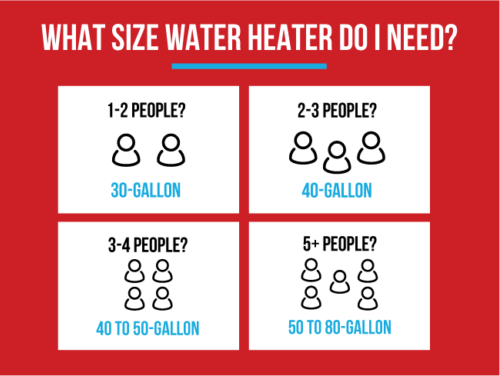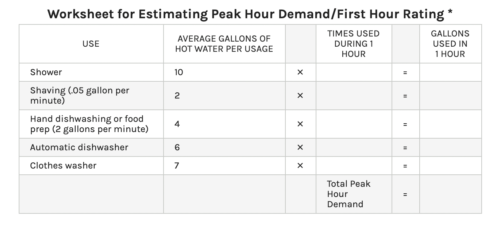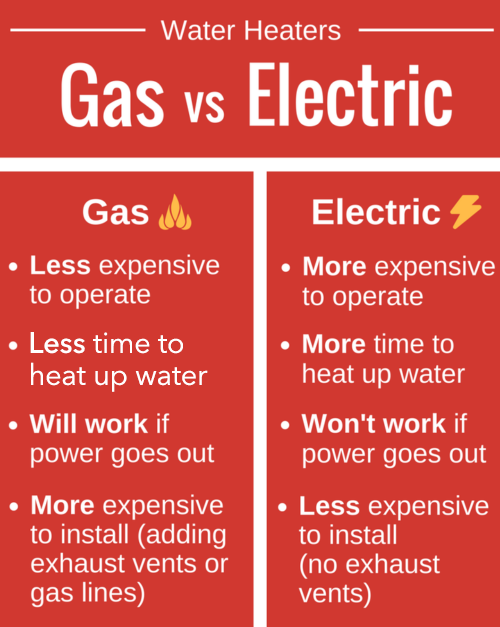How to Choose Your Water Heater Replacement
May 23, 2023
As a resident of Phoenix, AZ, you know how essential reliable hot water is for your daily routine—whether you’re taking a shower, washing dishes, or doing laundry. So if your hot water heater isn’t getting the job done anymore, it’s time to consider replacing it. There are several things to keep in mind when selecting a new water heater, including size of the tank, energy efficiency, and cost. We’ll take a look at each of these to help you make a sound investment in your water heater replacement.
How to Choose the Correct Tank Size
When it’s time for your water heater replacement in Phoenix, first consider the size of your household and your water usage. A larger household will require a larger tank to ensure that everyone has enough hot water for their needs. A tank that’s too small will constantly run out of hot water. You’ll pay higher utility costs to heat the remaining cold water at a higher temperature to meet your family’s demands. If your household needs a larger-sized tank, the investment will pay for itself.
On the other hand, a tank that is too large will heat unused water, costing you money in the long run. A Patrick Riley Plumbing expert can help you calculate your water usage and discuss your options for a water heater replacement.
How to Avoid Wasting Money or Energy
When you need a water heater replacement, finding the right-sized tank is important. Here are two easy ways to determine the size tank you’ll need:
#1 - Compare Your Household Size to Tank Sizes
To get a reasonable water heater replacement estimate, take a look at the chart below to match your household size with the appropriate water heater tank size:

What size water heater do I need based on my household size?
In the chart, the water heater tank size is determined by the number of people living in your home. For example, if you have more than two people living in your home, you’ll want a 40-gallon water heater tank at least.
#2 - Calculate Your “Peak Hour Demand” for Accuracy
Many Arizona households run multiple hot water fixtures or appliances at a time (i.e., kitchen faucet, washing machine, and bathroom showers). You’ll need a water heater that can keep up with your peak hour of demand. You might only have a two-person household, but if you use more than 30 gallons of hot water all at once, you’ll run out of hot water just as if you had more people living with you.
The good news is there’s an easy way to calculate your peak hot water consumption to find the right size of tank water heater to accommodate your needs before replacement.
First, visit Energy.gov and fill out their worksheet to estimate your “peak hour demand.” This refers to the amount of gallons of hot water you use at the time of day you frequently use it.

Worksheet for estimating your water heater’s peak hour demand and first hour rating
After you’ve determined your peak hour demand, be sure the water heater replacement you’re looking at has a “first hour rating” (FHR) within one to three gallons of that number.
The “first hour rating” refers to the amount of hot water the water heater can produce in a given hour. Although you may think, “Shouldn’t I buy a 40-gallon tank to produce 40 gallons of hot water at once?” that’s not the way it works.
Once you turn on the hot water tap and hot water flows to your faucet or appliance, new cold water will begin to flow into the tank to refill it. Once the tank is more than two-thirds empty, the majority of the tank will likely be too cold for your liking, which means you’ll have to wait for more hot water.
First hour ratings provide a realistic estimate for how many guaranteed gallons of hot water you’ll use in an hour.
When you’re shopping for a water heater replacement, you’ll notice that most have an “Energy Guide” label attached that provides the FHR rating.
How to Choose Between Gas vs Electric Water Heaters
Tank water heaters use either gas or electricity for fuel. In general, hot water heater replacements that use gas are more expensive. The required venting and safety precautions from a certified gas technician for gas power increases installation costs. However, this higher installation cost is balanced by reduced utility expenses since gas generally costs less on average than electricity.
When installing a new hot water heater in Phoenix, there are advantages and disadvantages to consider when using gas or electricity to fuel it. For a quick reference guide, see the below chart:

Pros vs cons of gas and electric water heater
How to Understand an Efficiency Rating
Most tank water heaters have an “energy factor” (EF) rating. EF ratings usually indicate how well insulated the tanks are for retaining heat and how they consistently heat new flowing water.
- For gas-powered water heaters, we recommend you select a water heater replacement with an EF of 0.60 or higher.
- For electric water heater replacements, we recommend an EF of 0.90 or higher.
You can find the EF ratings on the spec sheet for the water heater you’re considering. If you can’t find them there, check the manufacturer’s label on the outside of the tank.
Note: Electric water heaters generally have higher EF ratings. Combined with a solar system, this means big-time savings! However, for homes linked to the grid, an electric water heater with a high EF rating doesn’t necessarily guarantee lower expenses, as electricity from your electric company will cost more than gas.
Cost for Water Heater Installation in Phoenix
In Phoenix, the cost for a water heater replacement or installation typically ranges from $1,800 to $2,800, with a textbook estimate of $2,200.
Aside from the purchase price of your new tank, it’s important to budget for water heater installation because that’s where the majority of your costs will be. There are two significant cost factors to consider when you’re replacing a water heater:
#1 - The difficulty of water heater installation
The more work the water heater replacement requires, the more expensive it will be. Some examples include:
- Plumbing that isn’t up to code and needs an update
- New hot water heater gas lines or vents that need to be installed
- Tight spaces or areas that take more time to access
- Potential space modifications to accommodate a larger tank
#2 - Your choice of plumber or contractor
In general, more experienced plumbers will charge more for their water heater replacement services, reflecting their expertise, quality, and commitment to excellence. Don’t risk paying twice to fix a low-effort water heater installation. When you’re searching for a trustworthy plumber or contractor, look for these qualifications:
- Proof of licensing and insurance
- 10+ years of experience
- Recent, positive online reviews on sites like Google, Angi, and Facebook
- Honest, transparent pricing
- Written guarantee of work to be completed
Need a Water Heater Replacement? Hire the Best in Phoenix: Patrick Riley Cooling, Heating, & Plumbing!
Ask us for a free plumbing quote to learn how much it will cost to replace a water heater tank in Chandler or other places in the greater Phoenix area. Give us a call at (602) 286-0027, and we’ll send one of our expert plumbers at the agreed-upon time. We offer upfront prices, so you’ll never get a surprise bill!
Are you looking for another plumbing service? We offer a full suite of plumbing replacement and repair services. Visit our plumbing services page to learn more.
Originally published: October 12, 2021
Written by: Patrick Riley Cooling, Heating, & Plumbing
Related articles:
- How Much Does it Cost to Install a Tankless Water Heater in Phoenix?
- Gas vs Electric Water Heater: Which is Best For My Phoenix Home?
Get 10% off (Up to $150)

Ty Lindsay is the Director of Field Operations at Patrick Riley | Isley’s and a 15-year veteran of the plumbing and HVAC trades. In 2010, Ty earned his Journeyman’s plumbing license. He became a Master Plumber five years later and earned his Journeyman HVAC technician’s license that same year. Ty’s breadth of knowledge in plumbing and HVAC includes both residential and commercial work. He’s been a loyal member of the Patrick Riley | Isley’s team since 2016.
- Posted in:
- Buyer's Guide
